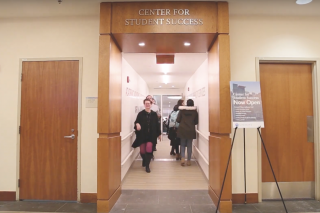Simmons faculty and staff are eager to help their students excel. Academic Support and the Office of Accessibility Services offer key resources to assist students on their academic and personal journeys. We spoke with Director JoJo Jacobson, Assistant Director Brendan Halpin, and Associate Director Autumn Grant about how they support Simmons students.

“My goal is to make sure that every student at Simmons has the tools they need to make them succeed,” says JoJo Jacobson ’10MA, the Director of Academic Support and Accessibility Services, located in the Center for Student Success (the ground floor of LeFavour Hall).
Jacobson fell in love with supporting students when tutoring at a junior college during their undergraduate studies. After obtaining a graduate degree in English from Simmons in 2010, they worked at a variety of universities and nonprofits that supported underserved students in the Boston area. In 2022, Jacobson returned to Simmons as a staff member. “What I love about Simmons is that people here are passionate about social justice,” says Jacobson. “People don’t just talk, they really live their beliefs. I also like working at a smaller school, which invites more collaboration.”
In conjunction with their work at Simmons, Jacobson is pursuing a doctoral degree in Education at Northeastern University. Their dissertation examines underserved student populations and embraces a methodology known as action research, in which interviewed individuals are active participants in the qualitative research process. “I am researching how we improve academic support services to better serve BIPOC and first-generation students. I have found that implementing very student-centric support, in which students are invited into the process, is the most beneficial to them.”
At Simmons, Academic Support services include one-on-one tutoring in a variety of disciplines, including Library and Information Science, Nursing, and Social Work. All Simmons students – on the ground, online, undergraduate, and graduate — qualify for tutorial services. Tutors are graduate and undergraduate peers, though all writing tutors are graduate students. “Our writing tutors are excellent writers themselves and are trained to work with students,” says Jacobson.
Under Jacobson’s directorship, Simmons’ Academic Support services have expanded. They have hired tutors in several additional subjects and are also building upon the Learning Assistant (LA) program, which trains upper-level students who provide tutoring and pedagogical support in STEM classes. “An LA is like a TA [teaching assistant],” explains Jacobson, “but LAs are embedded in courses and receive extensive pedagogical training. We have expanded our LAships to Math, Computer Science, and Statistics, and we hope to work with Chemistry and Physics faculty to develop the program further.” Jacobson also initiated a signup form for study groups, which helps connect students with their peers. Thanks to the recent renovation of LeFavour Hall, Academic Support offers new study spaces for these groups to convene (though students may also meet elsewhere on campus or virtually).

Brendan Halpin, Assistant Director of Academic Support at Simmons, trains all of the tutors and performs scheduling and logistics. Halpin taught high school and college-level English for 10 years. He continues to teach writing courses at Simmons. An accomplished writer, he has published several novels.
“The most significant thing we discuss [during tutor training] is our philosophy of tutoring,” says Halpin. “The easiest thing is to give them [the tutees] all the answers, but that is not always helpful in the long term. Instead, we strive to guide students through their thought processes rather than supply corrections.”
Halpin also emphasizes the importance of storytelling beyond classroom writing assignments. “When you go for a job interview, pitch a product, and so forth, you are basically telling a story. In my view, storytelling is a very pragmatic skill. People who can tell a good story are going to be successful.”
The Office of Accessibility Services (OAS) is the principal resource for students in need of accommodations, including (but not limited to) extra time on exams, note-taking software, and various residential and dining accommodations. Jacobson encourages students to register with OAS to initiate this process.

Autumn Grant, Associate Director of OAS, oversees accessibility requests and reviews the required documentation. Together with Jacobson, she works closely with faculty to answer their questions and to discuss how to best serve Simmons students with reasonable accommodations. Grant recently obtained her Ed.D. in Higher Education Administration from the University of Southern Mississippi. Her dissertation, “Disability Disclosure and Academic Advising: Factors that Influence Disability Disclosure to an Academic Advisor,” explores barriers to disability disclosure.
To support students’ academic success, OAS can provide technologies that facilitate learning. “For example, we can offer closed captioning for hearing-related disabilities and individuals with ADHD. We have contracts with additional assisted technologies that can convert PDFs or ebooks to speech/audio files, which may benefit certain students. We also employ a software called Glean, which uses AI to make transcripts of an audio recording,” explains Grant.
Beyond the classroom, OAS can enable diverse residential and dining accommodations. These may include wheelchair access in the dorms, allergy-friendly food in the dining halls, as well as service and emotional support animals in the classrooms and/or residential areas. Service animals (dogs and miniature horses) are recognized by the ADA and are trained to help their owners with specific tasks. Emotional support animals provide comfort and solace. These animals may live with Simmons students in residential contexts, provided that specific conditions are met.
“Disabilities are often invisible,” notes Grant. “Some people may have endured a past trauma, and, therefore, will need resources for PTSD, anxiety, and depression. At OAS, we treat students as individuals on a case-by-case basis to determine what accommodations will be best for their specific needs.”
OAS-related accommodations do require some form of documentation, typically detailing functional limitations and barriers. Simmons staff members are prepared to assist in this process. “We don’t want this to be an emotional barrier, so please talk to us and reach out so that we can help you,” says Jacobson.
While it is possible for certain accommodation requests to be denied, this usually involves what Grant calls a “fundamental alteration” of coursework or a degree program. “At the college level, a fundamental alteration might be someone wanting to be a Biology major but requesting not to take any Math classes, or a Ph.D. student requesting to substitute other work for a doctoral dissertation.” Jacobson, Halpin, and Grant all find their work in Academic Support and OAS immensely rewarding. “I am deeply grateful to do this work and I love working at Simmons,” reflects Jacobson.
As a wheelchair user, assisting students with accommodation needs is deeply personal for Grant. After struggling in college, she transferred to another institution with more comprehensive accessibility services, and that support made all the difference. “They [accessibility staff] were concerned with issues of access and mobility, but also cared about me as a person,” Grant recalls. “That motivated me to help other students have the same experience. Disability is part of our identity, but it should not create barriers to being a student and learning. At Simmons, it is most rewarding when students who come to OAS do not know that there is help related to their particular disability. Putting those options in front of students and having that lightbulb moment for them changes everything.”
For Halpin, Academic Support and OAS encapsulate the community vibe at Simmons: “Simmons fosters a very supportive environment. The students seem to be genuinely supportive of one another. Our staff and faculty truly care about student success.”

